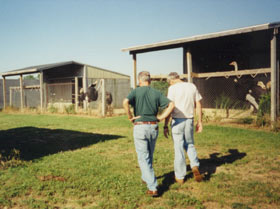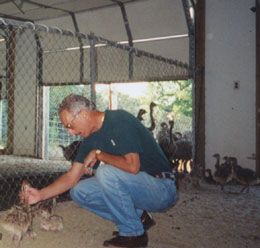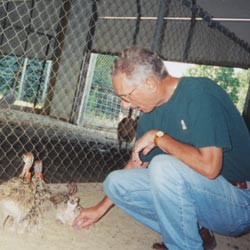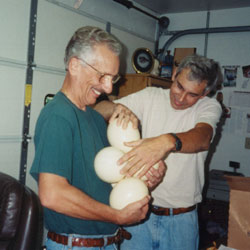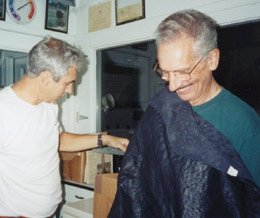|
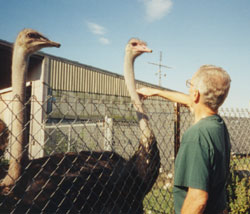 Al: Tell me about yourself if you
wouldn't mind. You are the first ostrich that
I've ever met, to say nothing of interviewing. First
of all, how did you get the name, Oedipus?
Al: Tell me about yourself if you
wouldn't mind. You are the first ostrich that
I've ever met, to say nothing of interviewing. First
of all, how did you get the name, Oedipus?
Oedipus: My owner, Nick, gave the name to
me. He was making a literary allusion to the character in
the Greek tragedy, Oedipus Rex. Oedipus
denied that he had an incestuous relationship with his mother.
To Nick, this denial reminded him of the folklore that ostriches
bury their heads in sand to avoid problems. He's
coming over to us now. Before he gets here, let me
introduce to you my wife, Electra-Carmen Electra.
Al: Nice to meet you Electra. Oedipus
has been gracious to spend some time with me today. I hope
that I don't interfere with anything.
Electra: No problem. It's nice to meet you.
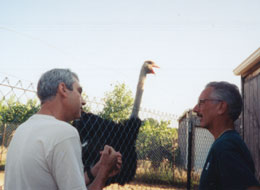 Oedipus: Nick, this is Al Campbell;
he's a columnist that came to interview me.
Oedipus: Nick, this is Al Campbell;
he's a columnist that came to interview me.
Nick: Nice to meet you. So, you came
to interview Oedipus. You'll find him an interesting
"bird." He doesn't often take to strangers
and rarely will talk to them. I've got some things to
do around the barn. If I can be of any help, just give me a
shout, but I'm sure that Oedipus will be able to answer any
of your questions.
Al: Thanks for letting me talk to your
ostrich. I won't keep him long.
Nick: Take all the time you need.
Al: Oedipus, where did ostriches come from?
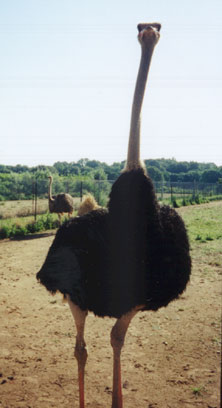 Oedipus: Well, ostriches originally came
from the African Savannah, and we've been around long before
human beings. We were imported to America in the last
couple hundred years. Today, they say that there are more
Ostriches in the United States than in Africa. We have been
mentioned in the Bible and lots of other historical writings from
Pliny to Shakespeare. The Egyptians loved ostriches and so
did the Zoroastrians. In fact, the followers of Zoroaster
considered us the divine bird of the storm. The
Babylonians, on the other hand, considered us to be evil. Ever
since human beings first laid eyes upon ostriches, we have
fascinated them. We are, after all, a very large bird
reaching up to eight feet tall and weighing in around three
hundred pounds.
Oedipus: Well, ostriches originally came
from the African Savannah, and we've been around long before
human beings. We were imported to America in the last
couple hundred years. Today, they say that there are more
Ostriches in the United States than in Africa. We have been
mentioned in the Bible and lots of other historical writings from
Pliny to Shakespeare. The Egyptians loved ostriches and so
did the Zoroastrians. In fact, the followers of Zoroaster
considered us the divine bird of the storm. The
Babylonians, on the other hand, considered us to be evil. Ever
since human beings first laid eyes upon ostriches, we have
fascinated them. We are, after all, a very large bird
reaching up to eight feet tall and weighing in around three
hundred pounds.
Al: You are large, but you can't fly, can
you?
Oedipus: Nope! We are flightless
because of our weak pectorals. However, we are the fastest
and the largest two-legged birds in the world. Our land
speed of 40 mph helps us to avoid most of our
predators-except for human beings.
Al: I'm sorry about that.
Oedipus: People have killed us for our
feathers and our leather. Did you know that we can produce
three or four pounds of feathers per bird. Nick will
probably want to show you a and
some eggs and a hide. I don't like that personally,
that kid was a friend of mine. People even grind-up our
feet and use the powder as an aphrodisiac. Fortunately for
us, Viagara has cut down of our being used to enhance male sexual
prowess.
Al: Viagra has certainly saved the day for all
ostriches.
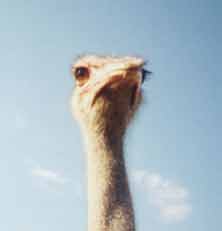 Oedipus: Well, Viagra might have saved some
of us, but even more destructive to us was the way you human
beings got into a health kick of lowering your cholesterol and
fat intake. Ostriches are a wonderful source of low-fat and
low-cholesterol red meat. Nick likes to say that we are the
meat of the new millenium. If that gets around, I'll
lose more friends and faster. However, you should see
him out on his Harley delivering the ostrich meat to his
customers. It would be funnier if they weren't my
friends that he was delivering.
Oedipus: Well, Viagra might have saved some
of us, but even more destructive to us was the way you human
beings got into a health kick of lowering your cholesterol and
fat intake. Ostriches are a wonderful source of low-fat and
low-cholesterol red meat. Nick likes to say that we are the
meat of the new millenium. If that gets around, I'll
lose more friends and faster. However, you should see
him out on his Harley delivering the ostrich meat to his
customers. It would be funnier if they weren't my
friends that he was delivering.
Al: I'm sorry about that also.
Oedipus: Well, be that as it may, we
continue to be victimized by humans. Long ago, people have
discovered that we are like chickens in that, if you take away
our eggs, females will lay an egg almost every week all year
round. Those eggs are then hatched in incubators and the
offspring are raised like you would raise chicks from eggs.
Al: I didn't know that. I thought
that we just made very large omelets with them?
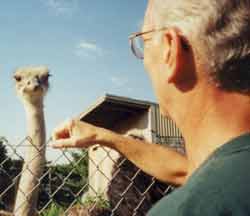 Oedipus: That's not funny. However,
ostrich eggs can weigh over three pounds. One of our eggs
equals about two dozen hen eggs. I bet that you didn't
know that either. At any rate, our eggs are used for
breeding purposes or for decorating.
Oedipus: That's not funny. However,
ostrich eggs can weigh over three pounds. One of our eggs
equals about two dozen hen eggs. I bet that you didn't
know that either. At any rate, our eggs are used for
breeding purposes or for decorating.
Al: Decorating?
Oedipus: Oh, yes. Many people
consider it a real art form. Our eggs are nothing like the
Easter eggs that you hide for your children. These are very
ornate and intricate pieces of fine art. But I don't
think that you should use our eggs for art. That's why
you have canvas on which to paint so that you don't have to
use our next generation.
Al: Tell me about how ostriches raise their
chicks in the wild.
Oedipus: Well, it takes about a month and a
half for an ostrich egg hatch. The chick, when it comes
out, is nearly a foot tall and can grow a foot per month until it
reaches maturity. By eighteen months, female ostriches can
start breeding and will continue until about the age of
forty-five. In nature, the male sits on the egg at night
while the female does daytime duty. It should be noted that
males care for the chicks until they are able to take care of
themselves. Let me show you what my mating dance looks
like.
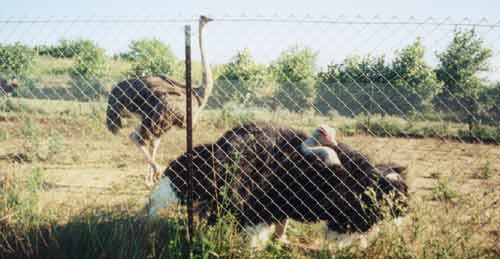
Al: I have watched several of
your friends pecking at anything they see including people.
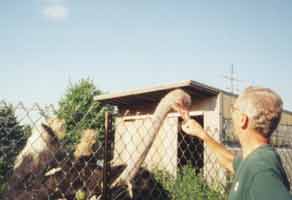 Oedipus: We don't actually peck at
people. We are only very curious about anything we
see-like shinny things like your ring. Look, this
won't hurt a bit. See? Did that hurt? Also,
note how large my eyes are. Actually, our eyes are larger
than our brains. Please, no jokes about that either. We
have very good eyesight, and we are very inquisitive about what
our eyes see.
Oedipus: We don't actually peck at
people. We are only very curious about anything we
see-like shinny things like your ring. Look, this
won't hurt a bit. See? Did that hurt? Also,
note how large my eyes are. Actually, our eyes are larger
than our brains. Please, no jokes about that either. We
have very good eyesight, and we are very inquisitive about what
our eyes see.
Speaking about our brains, the Roman Emperor
Heliogabalus was extremely fond of our brains. It has been
reported that on one occasion, he had a banquet where he served
over six hundred ostrich brains. I believe that he not only
enjoyed the taste but felt that ingesting ostrich brains would
improve his mental capacities. I'm glad that that
tradition didn't catch on like the aphrodisiac one did.
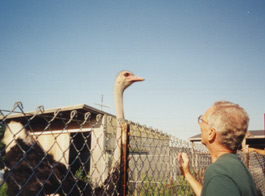 Al: Oedipus, you mentioned that Nick
names you because of the folklore about ostriches sticking your
heads in the sand. What are your suggestions regarding denial and
not sticking ones head in the proverbial sand.
Al: Oedipus, you mentioned that Nick
names you because of the folklore about ostriches sticking your
heads in the sand. What are your suggestions regarding denial and
not sticking ones head in the proverbial sand.
Oedipus: My suggestion, which is based upon
personal experience, is to face the music. We all tend to
try to avoid painful situations whether ostriches or people.
However, when we do that, it merely compounds the problem. It
is like just paying interest on a credit card bill-the debt
merely gets larger as time goes by.
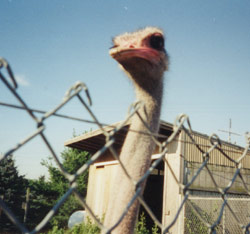 Al: That makes sense, but it is hard to be
proactive about problems. Whenever I confront a painful
situation, I often pull away from the problem-hoping that it
will go away.
Al: That makes sense, but it is hard to be
proactive about problems. Whenever I confront a painful
situation, I often pull away from the problem-hoping that it
will go away.
Oedipus: Well, that is a natural response
for all animals. However remember what Mark Anthony said in
Shakespeare's Julius Caesar,
"Cowards die many times before their death, the valiant
taste of death but once." I'm not denying the
pain, but not facing the pain merely causes you to absorb the
pain each time you think about it. Suppose you are afraid
to deal with a problem at work. Facing the music may be
painful. However, each time you worry about it, you suffer
the pain again and again. If you postpone confronting a
problem for a week, you could have inflicted the pain upon
yourself dozens of times by procrastinating. Had you just
dealt with it quickly, you would have saved yourself a lot of
grief.
Al: Sounds like a good idea, but I just
don't like having to face problems.
Oedipus: I know what you mean. I use
to dread seeing new problems come my way, but I learned to
welcome problems. Problems are merely
assets-opportunities for success.
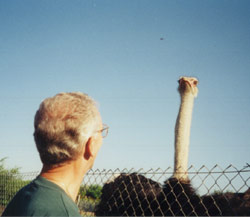 Al: How's that?
Al: How's that?
Oedipus: Problems provide you with golden
opportunities to change the status quo. If you seize the
problems, you can make them work for you. The guy that
cares for me and the rest of my friends was downsized right out
of a mediocre job-one in which he would have stayed until he
retired. You can imagine the shock and depression when he
was let go. He could have just sat back in his depressed
mood and felt sorry for himself. However, he took the
problem and creatively came up with another job. He started
this ranch. He liked animals and the loss of his job that
wasn't going anywhere allowed him to think of other
possibilities. Look at him now. He is happy with us
and his ranch. The problem became a blessing.
Take a problem that you are facing and assume
that it is a blessing and not a curse. If you do, you will
find opportunity to improve your situation. Try it;
you'll like the results. I promise you.
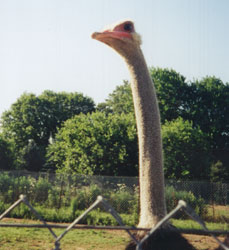 Al: Okay, I'll do that.
Al: Okay, I'll do that.
Oedipus: But make sure that you start your
problem solving with the belief that it will work for you. Henry
Ford said, "You can believe you can or you can believe you
can't, either way you will be correct."
Al: You're certainly well read.
Oedipus: Well, if you keep your eyes and
ears open, you'll learn a lot just by observing.
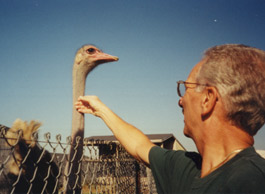 Al: Well, you are a great spokesperson for
this view.
Al: Well, you are a great spokesperson for
this view.
Oedipus: Experience is a great teacher.
I've tried to avoid pain, but it is too painful to do so.
Here comes Nick, again. I'll ask him to show you our
newborns chicks. He'll probably show you his
collection of eggs and leather products. I hate that, but
it's ranch.
Oedipus: Nick, would you show Al our recent offspring?
Nick: Sure, come along to the barn. I'll
show you some eggs and leather goods also.
Note: Oedipus
wouldn't appreciate this, but you can order ostrich meat
from Nick Stama, Wild Dream Ostrich Ranch, 10332 Singer Lake Rd.,
Baroda, MI 49101. His telephone number is 1-616-422-1211.
|







 Al: Tell me about yourself if you
wouldn't mind. You are the first ostrich that
I've ever met, to say nothing of interviewing. First
of all, how did you get the name, Oedipus?
Al: Tell me about yourself if you
wouldn't mind. You are the first ostrich that
I've ever met, to say nothing of interviewing. First
of all, how did you get the name, Oedipus? Oedipus: Nick, this is Al Campbell;
he's a columnist that came to interview me.
Oedipus: Nick, this is Al Campbell;
he's a columnist that came to interview me. Oedipus: Well, ostriches originally came
from the African Savannah, and we've been around long before
human beings. We were imported to America in the last
couple hundred years. Today, they say that there are more
Ostriches in the United States than in Africa. We have been
mentioned in the Bible and lots of other historical writings from
Pliny to Shakespeare. The Egyptians loved ostriches and so
did the Zoroastrians. In fact, the followers of Zoroaster
considered us the divine bird of the storm. The
Babylonians, on the other hand, considered us to be evil. Ever
since human beings first laid eyes upon ostriches, we have
fascinated them. We are, after all, a very large bird
reaching up to eight feet tall and weighing in around three
hundred pounds.
Oedipus: Well, ostriches originally came
from the African Savannah, and we've been around long before
human beings. We were imported to America in the last
couple hundred years. Today, they say that there are more
Ostriches in the United States than in Africa. We have been
mentioned in the Bible and lots of other historical writings from
Pliny to Shakespeare. The Egyptians loved ostriches and so
did the Zoroastrians. In fact, the followers of Zoroaster
considered us the divine bird of the storm. The
Babylonians, on the other hand, considered us to be evil. Ever
since human beings first laid eyes upon ostriches, we have
fascinated them. We are, after all, a very large bird
reaching up to eight feet tall and weighing in around three
hundred pounds. Oedipus: Well, Viagra might have saved some
of us, but even more destructive to us was the way you human
beings got into a health kick of lowering your cholesterol and
fat intake. Ostriches are a wonderful source of low-fat and
low-cholesterol red meat. Nick likes to say that we are the
meat of the new millenium. If that gets around, I'll
lose more friends and faster. However, you should see
him out on his Harley delivering the ostrich meat to his
customers. It would be funnier if they weren't my
friends that he was delivering.
Oedipus: Well, Viagra might have saved some
of us, but even more destructive to us was the way you human
beings got into a health kick of lowering your cholesterol and
fat intake. Ostriches are a wonderful source of low-fat and
low-cholesterol red meat. Nick likes to say that we are the
meat of the new millenium. If that gets around, I'll
lose more friends and faster. However, you should see
him out on his Harley delivering the ostrich meat to his
customers. It would be funnier if they weren't my
friends that he was delivering. Oedipus: That's not funny. However,
ostrich eggs can weigh over three pounds. One of our eggs
equals about two dozen hen eggs. I bet that you didn't
know that either. At any rate, our eggs are used for
breeding purposes or for decorating.
Oedipus: That's not funny. However,
ostrich eggs can weigh over three pounds. One of our eggs
equals about two dozen hen eggs. I bet that you didn't
know that either. At any rate, our eggs are used for
breeding purposes or for decorating.
 Oedipus: We don't actually peck at
people. We are only very curious about anything we
see-like shinny things like your ring. Look, this
won't hurt a bit. See? Did that hurt? Also,
note how large my eyes are. Actually, our eyes are larger
than our brains. Please, no jokes about that either. We
have very good eyesight, and we are very inquisitive about what
our eyes see.
Oedipus: We don't actually peck at
people. We are only very curious about anything we
see-like shinny things like your ring. Look, this
won't hurt a bit. See? Did that hurt? Also,
note how large my eyes are. Actually, our eyes are larger
than our brains. Please, no jokes about that either. We
have very good eyesight, and we are very inquisitive about what
our eyes see. Al: Oedipus, you mentioned that Nick
names you because of the folklore about ostriches sticking your
heads in the sand. What are your suggestions regarding denial and
not sticking ones head in the proverbial sand.
Al: Oedipus, you mentioned that Nick
names you because of the folklore about ostriches sticking your
heads in the sand. What are your suggestions regarding denial and
not sticking ones head in the proverbial sand. Al: That makes sense, but it is hard to be
proactive about problems. Whenever I confront a painful
situation, I often pull away from the problem-hoping that it
will go away.
Al: That makes sense, but it is hard to be
proactive about problems. Whenever I confront a painful
situation, I often pull away from the problem-hoping that it
will go away. Al: How's that?
Al: How's that? Al: Okay, I'll do that.
Al: Okay, I'll do that. Al: Well, you are a great spokesperson for
this view.
Al: Well, you are a great spokesperson for
this view.